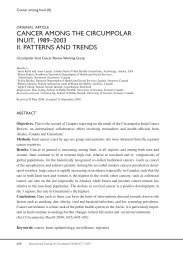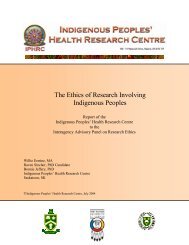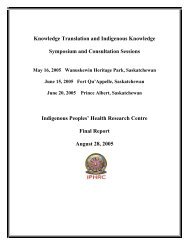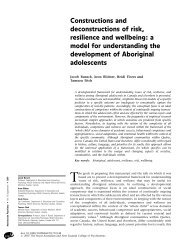EVALUATION OF THE ONTARIO COMMON ASSESSMENT ... - CCIM
EVALUATION OF THE ONTARIO COMMON ASSESSMENT ... - CCIM
EVALUATION OF THE ONTARIO COMMON ASSESSMENT ... - CCIM
You also want an ePaper? Increase the reach of your titles
YUMPU automatically turns print PDFs into web optimized ePapers that Google loves.
OCAN Evaluation for Aboriginal Mental Health Programs<br />
This approach allowed for clear comparisons of the implementation of OCAN in mainstream and<br />
Aboriginal programs on several levels.<br />
Identifying unique aspects of Aboriginal services: While some aspects of the implementation of<br />
OCAN apply to Aboriginal programs as well as mainstream programs, there are other aspects that<br />
are unique to the Aboriginal service context. We therefore developed a research plan that<br />
included a review and examination of differences in the implementation of OCAN in Aboriginal<br />
mental health programs that may be a result of the diversity of Aboriginal peoples, cultures,<br />
service environments and geography. In addition, we examined potential differences in service<br />
provision in First Nations communities, funding and jurisdictional issues, cultural safety in mental<br />
health as well as historic issues.<br />
Cultural Safety: Cultural awareness, competence, sensitivity and safety have different meanings<br />
that their use is not always consistent in the academic literature. The concept of cultural safety<br />
originates with the Maori People of New Zealand, and embodies a concept that goes beyond<br />
providers learning about cultural differences. It describes an approach to service provision that<br />
incorporates provider self-reflection and understanding of power differentials that often exist<br />
between Aboriginal clients or patients and health services providers. Therefore it is vital that in<br />
culturally safe services, it is the client who defines "safe services” 3 4 . Of great importance to many<br />
Aboriginal people in the North Eastern Ontario is service provider acceptance of beliefs, religions,<br />
backgrounds, and history, and a focus on building on the strengths of Aboriginal people 5 .<br />
Respect for Aboriginal perspectives on research: Aboriginal people often feel that they have<br />
been over researched and are thus frequently critical of government or university interests in<br />
conducting research within their communities. Research initiated by outsiders may raise concerns,<br />
particularly when the topic of research is sensitive such as mental health research. Researchers who<br />
work in Aboriginal communities often come in contact with communities and individuals who have<br />
participated in research projects and have felt harmed or violated, despite the fact that research<br />
protocols received ethics approval from a university or hospital-based research ethics board (REB).<br />
Aboriginal people commonly see the lack of collaboration and community focus in research design<br />
and implementation as an ethical issue that must be resolved.<br />
Our evaluation team was committed to a research approach, informed by and respectful of cultural<br />
values of the Aboriginal people and communities who participated in this evaluation. We strived<br />
for transparency in the research process and sought feedback on evaluation instruments and<br />
methods from each participating organization. For example, we encouraged review and feedback<br />
on interview questions for clients from representatives from the Aboriginal community and partners<br />
3 Ramsden I: Cultural safety. N Z Nurs J 1990, 83(11):18-19.<br />
4 Varcoe C, McCormick J: Racing around the classroom margins: Race, racism and teaching nursing. In Teaching nursing:<br />
Developing a student-centred learning environment. Edited by: Young L, Paterson B. Philadelphia: Lippincott, Williams &<br />
Williams; 2006:437-466.<br />
5 2009 Maar, M.. , B. Erskine, L. McGregor, M. Sutherland, D. Graham, T. Larose, M. Shawande, and T. Gordon. Innovations on<br />
a shoestring: A Study of a Collaborative Community-based Aboriginal Mental Health Service Model in Rural Canada.<br />
International Journal of Mental Health Systems 3:27. Accessible at www.ijmhs.com/content/3/1/27<br />
Sutherland & Maar - March 2010 Page 11








